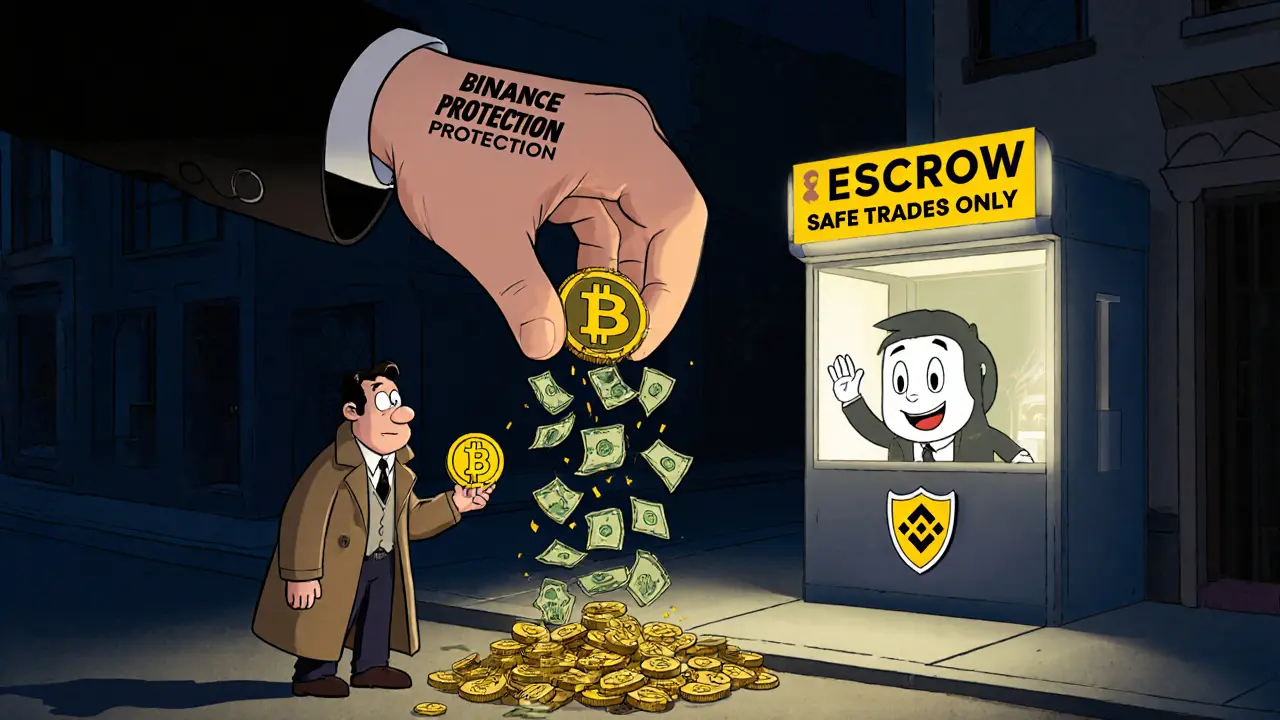Underground Crypto Market in Ecuador: What’s Really Happening Beyond the Law

Nov, 1 2025
P2P Crypto Trade Risk Calculator
This tool calculates the risks of informal crypto trades in Ecuador versus regulated platforms. Enter your trade details to see the difference in security, time, and potential losses.
When people talk about an underground crypto market in Ecuador, they’re often imagining secret deals, cash-for-Bitcoin back alleys, or hidden exchanges operating beyond government reach. But here’s the truth: there’s no verified underground crypto market in Ecuador-not in the way most people picture it. That doesn’t mean crypto isn’t used outside the system. It just means the lines between legal and informal are blurrier than you think.
Legal Crypto Is Already Widely Available
Ecuador doesn’t ban cryptocurrency. Since 2021, the government clarified that buying, selling, and holding Bitcoin and other digital assets is perfectly legal. What’s not legal is using crypto as payment for goods and services-so you can’t walk into a grocery store and pay with Bitcoin. But you can trade it freely on platforms like Binance, Bybit, Gemini, and Bit2Me. These aren’t shady operations. They’re global exchanges with full compliance teams, KYC checks, and cold storage systems that meet ISO 27001 and SOC 2 Type 2 standards.For most Ecuadorians who trade crypto, this is the only path they know. Bit2Me lets users buy Bitcoin with credit cards. Binance P2P lets you trade USDT for cash via bank transfer, mobile wallet, or even in-person meetups at malls. LocalCoinSwap supports over 300 payment methods. These aren’t underground tools-they’re the mainstream.
Where the ‘Underground’ Really Lives
If there’s an underground side to crypto in Ecuador, it’s not in secret exchanges. It’s in the gray zone between legal platforms and informal cash deals. Think of it like this: you’re not breaking the law by trading crypto. But if you meet someone at a bus stop to exchange $200 cash for 0.005 BTC, that’s not regulated. No KYC. No record. No protection.These peer-to-peer cash trades happen. They always will. In countries with unstable currencies and limited banking access, cash-for-crypto is a survival tool. Ecuador’s economy has seen inflation spikes, bank restrictions, and distrust in the national currency. Many people turn to crypto not for speculation, but to protect their savings. And when banks limit withdrawals or charge high fees, cash-based crypto trades become attractive-even if they’re risky.
There’s no evidence of organized criminal crypto rings operating in Ecuador. No major busts. No government warnings about illegal crypto hubs. That’s telling. If there were large-scale underground exchanges, regulators would have acted. The Central Bank of Ecuador has never issued a notice about shutting down illegal crypto operations. That’s because they don’t need to. The legal infrastructure is already working.
Why People Avoid the Legal System
So why do some still turn to informal trades? Three reasons: speed, anonymity, and access.- Speed: Bank transfers can take 2-3 business days. Cash trades take minutes.
- Anonymity: KYC means your ID, phone number, and bank details are stored. Cash? No paper trail.
- Access: Many Ecuadorians don’t have bank accounts. Or their accounts are frozen due to low balances or past overdrafts. Crypto via cash is their only option.
This isn’t criminal behavior. It’s economic adaptation. It’s the same reason people in Argentina, Nigeria, or Venezuela use P2P crypto markets. The system isn’t designed for them, so they build their own workarounds.

What the Law Actually Says
Ecuador’s legal stance is simple: crypto is property, not money. You can own it. You can trade it. You can’t use it to pay for your bus ticket. The 2018 Electronic Money Law created rules for digital wallets tied to the national currency-but it explicitly excluded decentralized cryptocurrencies. That’s why exchanges aren’t illegal. They’re just not allowed to offer crypto as payment.Exchanges must register with the Superintendency of Companies, Securities, and Insurance (Superintendencia de Compañías, Valores y Seguros). They must report suspicious transactions under AML rules. But they’re not required to monitor every cash trade between two individuals. That’s the gap.
There’s no law saying you can’t trade Bitcoin for cash in a parking lot. There’s just no protection if something goes wrong. No chargebacks. No recourse. If the person you traded with disappears with your cash, you’re out of luck.
Real Risks of Informal Crypto Trades
People think informal trades are safe because they’re “just cash.” But they’re not. Here’s what can go wrong:- Scams: Someone pays you in cash for Bitcoin, then claims the transfer never went through and demands a refund. You’re left with nothing.
- Stolen cash: Carrying large sums of cash makes you a target.
- Price manipulation: Without market transparency, sellers can charge 10-20% above the spot price.
- Legal gray zone: If you’re caught with large amounts of unexplained cash, authorities might question its source-even if it came from crypto.
Legal exchanges don’t have these risks. Binance P2P, for example, holds your crypto in escrow until you confirm cash receipt. If the buyer doesn’t pay, you get your Bitcoin back. That’s protection. Informal trades don’t offer that.
What’s Actually Growing in Ecuador
The real crypto trend in Ecuador isn’t underground. It’s education. Bit2Me Academy has trained over 120,000 Ecuadorians in blockchain basics. YouTube tutorials on how to use Binance P2P are among the top finance videos in Spanish. Local meetups in Quito and Guayaquil focus on crypto security, not illegal trading.Young professionals are using crypto to send remittances. Farmers are selling produce and accepting USDT via mobile wallets. Small businesses are using crypto to avoid bank fees. These aren’t underground activities. They’re quiet, legal innovations.
The government isn’t fighting crypto. It’s watching it. And so far, it’s decided that regulation-not prohibition-is the better path.
What You Should Do
If you’re in Ecuador and want to trade crypto, here’s your roadmap:- Use a licensed exchange: Binance, Bybit, Gemini, or Bit2Me.
- Enable two-factor authentication and use cold storage for long-term holdings.
- Use P2P trading only through the exchange’s built-in escrow system-never outside it.
- Never trade cash for crypto with strangers you don’t trust.
- Learn the basics through free resources like Bit2Me Academy or Binance Learn.
You don’t need to go underground. The legal system already works. It’s just not loud enough for people to notice.
Why the Myth Persists
The idea of an underground crypto market in Ecuador persists because it fits a story people want to believe: that crypto is rebellious, secretive, and dangerous. But in Ecuador, crypto is quiet, practical, and increasingly normal.It’s not about hiding. It’s about using. And the people who use it best aren’t the ones trading in alleys. They’re the ones using Binance P2P with verified identities, watching their balances grow, and teaching their neighbors how to do the same.
The real underground isn’t in cash deals. It’s in the silence of a system that works better than anyone expected.
Is it illegal to trade Bitcoin in Ecuador?
No, it’s not illegal. Ecuador allows citizens to buy, sell, and hold Bitcoin and other cryptocurrencies. The government clarified this in 2021. However, you cannot use crypto as payment for goods or services-that’s prohibited. Trading on regulated exchanges is fully legal.
Are there underground crypto exchanges in Ecuador?
There are no verified underground crypto exchanges operating in Ecuador. No government reports, news investigations, or financial regulators have identified any illegal crypto platforms. The term ‘underground’ usually refers to informal cash trades between individuals, not organized black-market exchanges.
Can I buy Bitcoin with cash in Ecuador?
Yes, but only through legal P2P platforms like Binance or LocalCoinSwap. These platforms match buyers and sellers and hold crypto in escrow until cash is confirmed. Trading cash directly with strangers outside these platforms is risky and offers no protection if you’re scammed.
Why do some Ecuadorians avoid using regulated exchanges?
Some avoid regulated exchanges due to lack of bank accounts, distrust in financial institutions, or desire for anonymity. Others use cash trades for speed-bank transfers can take days, while cash swaps are instant. But these informal methods carry high risk and no legal recourse.
What’s the safest way to buy crypto in Ecuador?
Use a licensed exchange like Binance, Gemini, or Bit2Me. Enable 2FA, use their built-in P2P escrow system, and avoid direct cash deals. Store long-term holdings in a hardware wallet. These platforms comply with AML/KYC rules and offer customer support, cold storage, and fraud protection.
Is crypto used for money laundering in Ecuador?
There is no public evidence of crypto being used for large-scale money laundering in Ecuador. Regulated exchanges are required to report suspicious activity. The country’s crypto market is small compared to others in Latin America, and most activity is retail trading or remittances-not criminal finance.
Can I use crypto to pay for things in Ecuador?
No. Ecuador’s government prohibits using cryptocurrencies as legal tender. You cannot pay for groceries, fuel, or public transport with Bitcoin or USDT. Doing so could violate financial regulations. Crypto is treated as property, not currency, for transactions.